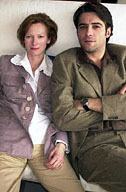
Movie Guru Rating:

Comment
on this review
| |

The Deep End cleanly parts the stale summer movie waters
by Zak Weisfeld
It must've been a dream. At least I hope it was. But the question is how long have I been asleep? I remember it was winter 2001 and it was very cold but after awhile it got to be warm and then the lights went out. That's when the explosions came. And they never stopped.
But in between the explosions there were other things too. Vaguely, vaguely I remember—there were leather-clad monkeys, man-eating pigs, man-eating men...or was it pig-eating men? There was the sound of crunching popcorn and the sweet slurping of carbonated beverages, stick figure television producers in love and something else...yes.
Yes, I remember, there was a woman with lips like a creature that lives on the ocean floor, something with blind eyes and a glowing proboscis...maybe she sang sailors to their doom, or sold video games and tacos. Could it have been real? Could these be real movies? I mean Jesus, who would make such things? Who would watch them? And why? No. No. I must have been dreaming. It's the only answer.
But now, at least momentarily, the cold, blue waters of The Deep End's Lake Tahoe have awakened me. To describe The Deep End as one of the best American movies of the year is to say virtually nothing about The Deep End and a horrifying amount about the quality of this year's crop of films. The Deep End is not mind-blowing; it does not represent a dramatic rearranging of this country's cinematic geography; it's nothing more, and nothing less, than a well-crafted little thriller. And honestly, what more could anyone want from a movie?
Well, there is the spectacular photography of Lake Tahoe, which cinematographer Giles Nuttgens makes look like as pristine and remote as an undiscovered fjord (never before have I wanted to live so close to Nevada). The lake and the country that surround it seem forbidding, almost uninhabited except for the cozy, too quaint home of the Hall family. Here, in a shingled cottage with an unnerving number of windows live mother Margaret, eldest son Beau, two younger children and Margaret's husband's father. It's a picture of a kind of bliss, really—all sunshine and clean water and healthy, well-scrubbed children.
In fact, all that stands between the Halls and the kind of perfection seen only in ads for SUVs is the absence of Mr. Hall—a Navy captain away, and unreachable, somewhere in the middle of the Atlantic. But in his absence Mr. Hall becomes the prime mover of the plot—and, ultimately, the only character in the film who emerges unscathed, his innocence still intact.
The story of The Deep End, based on a novel by Elisabeth Sanxay Holding, begins as simply an attempt to keep son Beau's budding homosexuality a secret from his absentee Navy father. But, as Margaret disposes of the first body, The Deep End becomes much more than that. It's a coming-of-age story, for both mother and son; and it's a love story, sort of; all wrapped in the cool veneer of a carefully paced thriller—complete with corpses, sex tapes, blackmail and murder.
Holding this all together is Tilda Swinton—an actress so physically spare, so minimalist and monochromatic that she seems an unlikely embodiment of motherhood, a Manga version of Mrs. Brady. But as the pressure mounts, Swinton's portrayal of a kind of streamlined, whipcord motherhood begins to make more sense. She is mother as verb, her love and protectiveness seen, not in abstract, but in action.
It's only when she meets Alek Sperra, a low-rent semi-mobster played with brooding, Eastern European perfection by Goran Visnjic, that Swinton seems finally to have blood. Visnjic, on the other hand, has nothing else. His Alek Sperra is part Kafka, part Tarantino and his life in gritty, neon-ed Reno seems to be a kind of antithesis to Swinton's sylvan Tahoe City.
Their relationship is the trickiest part of the movie and it's a testament to the skill of directors Scott McGehee and David Siegel that The Deep End manages it without devolving into cheap melodrama. But from the beginning it's clear that McGehee and Siegel are confident about their ability to shift tones without straining credulity. Throughout, McGehee and Siegel eschew histrionics; the pressure here builds steadily and quietly—a slow descent through clear water, a descent that becomes a kind of beautiful, crystalline crucible for everyone involved. Including the audience.
It's a wonderful treat to be drawn in so smoothly, to be so elegantly smothered, rather than bludgeoned, by a movie. Not that The Deep End is perfect. There are moments that are too smooth, and what violence there is feels clumsy and overly staged. Both McGehee and Siegel are clearly more comfortable with atmosphere than with conflict. But these are quibbles, not major faults. What's most unfortunate about The Deep End is how simple it looks; how frustratingly easy it makes it seem to make a good, if not great, movie. The question The Deep End begs is why so few others seem willing or able to do the same.

September 6, 2001 * Vol. 11, No. 36
© 2000 Metro Pulse
|





